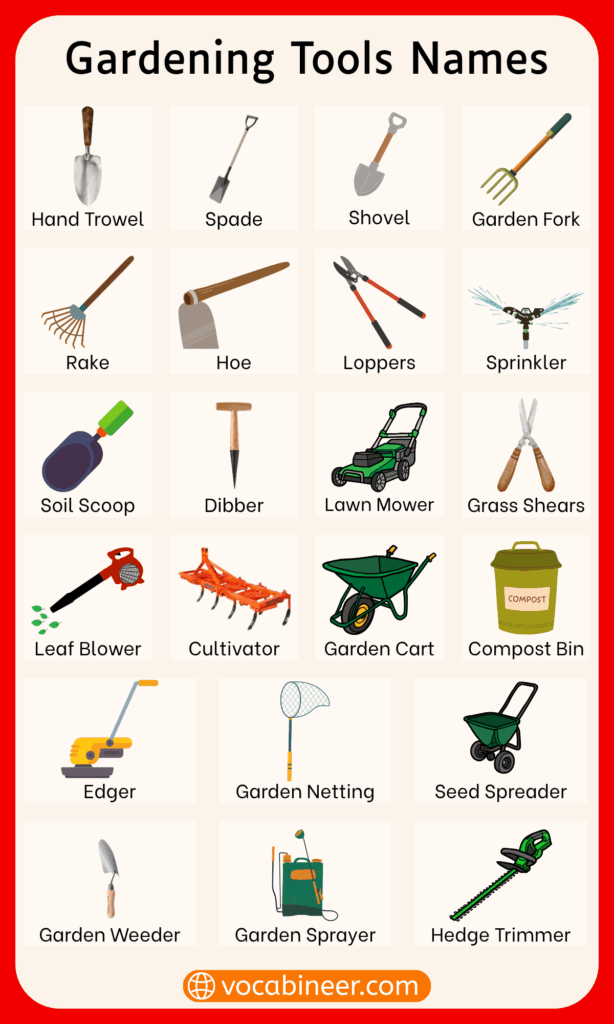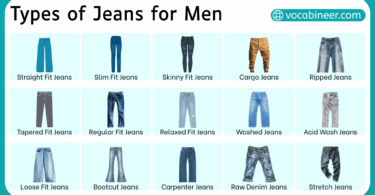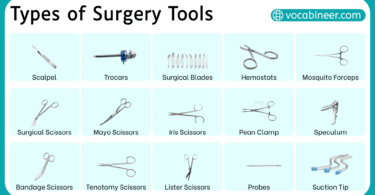Gardening tools help with tasks like digging, planting, cutting, and watering plants. Learning their English names is helpful for students, home gardeners, and anyone interested in growing plants. This guide lists common gardening tool names with pictures, grouped by how they are used. Each section explains what the tools do and when to use them in the garden.
In This Page
Common Gardening Tools in English with Pictures
These are the most basic tools used in almost every type of garden. They are important for preparing the soil, planting seeds, watering, and cleaning up:
- Shovel – used to dig, lift, and move soil
- Rake – helps in clearing leaves and smoothing soil
- Hoe – breaks up soil and removes weeds
- Trowel – small hand tool for planting and transplanting
- Pruning Shears – used to cut branches and stems
- Watering Can – for watering small garden areas
- Garden Fork – loosens soil and removes weeds
- Gloves – protect hands from dirt, thorns, and bugs
- Wheelbarrow – used to carry soil, compost, or plants
- Hose – supplies water to different garden parts

Hand Gardening Tools Names in English
Hand tools are easy to carry and perfect for small jobs. They are ideal for use in flower beds, pots, and tight areas:
- Trowel – digs small holes for planting
- Hand Fork – loosens soil and mixes in fertilizer
- Weeder – removes weeds by pulling them out from the root
- Hand Rake – gathers leaves or loosens soil in flower beds
- Pruners – trims stems and light branches
- Transplanter – helps move plants without harming roots
- Dibber – pokes holes for seeds and small plants
Digging Tools Names for Soil Preparation
Digging tools help gardeners prepare the land for planting. These tools are strong and used for turning soil and digging deep holes:
- Shovel – moves loose soil or compost
- Spade – flat-edged tool for slicing into soil
- Garden Fork – breaks up hard ground and spreads mulch
- Mattock – combines axe and hoe, good for breaking compact soil
- Pickaxe – strong tool to break rocky or hard soil
- Auger – drills uniform holes for planting bulbs or stakes
Names of Watering Tools for Plants with Pictures
Watering tools make sure plants get the right amount of water. Some are for gentle watering; others help cover large areas:
- Watering Can
- Hose Pipe
- Garden Sprayer
- Drip Irrigation System
- Soaker Hose
- Sprinkler
- Watering Wand
- Water Timer
- Pump Sprayer
- Hose Nozzle
- Rain Barrel with Spout
- Plant Misting Bottle
- Irrigation Spike
- Self-Watering Globes
- Watering Bag (for trees)
Cutting and Trimming Gardening Tools Names
Cutting tools are used to shape plants, remove dead parts, and harvest crops. Good tools help keep plants healthy and growing:
- Pruning Shears – sharp scissors for clean cuts on stems
- Loppers – long handles to reach and cut thicker branches
- Hedge Trimmer – shapes bushes and hedges
- Grass Shears – trims grass around flower beds or paths
- Edging Shears – cuts neat edges along walkways or borders
Planting and Seeding Tools for Gardeners
These tools help you place seeds and young plants into the soil correctly and easily:
- Hand Trowel
- Dibber (or Dibbler)
- Garden Fork
- Seed Spreader
- Garden Hoe
- Seed Tray
- Planting Auger
- Bulb Planter
- Garden Spade
- Soil Scoop
- Garden Rake
- Transplanter
- Row Marker
- Garden Gloves
- Watering Can (for seedlings)
- Seedling Heat Mat
Cleaning and Maintenance Tools for Garden Work
Keeping the garden clean is important. These tools help collect leaves, clean up messes, and carry garden waste:
- Leaf Rake – gathers fallen leaves and light debris
- Garden Broom – sweeps garden paths and patios
- Compost Fork – turns compost and organic matter
- Wheelbarrow – moves heavy soil, tools, or debris
- Garden Waste Bag – collects leaves and clippings
- Leaf Blower – blows away dry leaves quickly
Electric and Power Tools Used in Gardening
Power tools save time and effort in larger or busy gardens. They work faster than manual tools and are great for heavy tasks:
- Electric Hedge Trimmer – quickly shapes hedges
- Lawn Mower – cuts grass evenly
- Leaf Blower – clears leaves from large areas
- Electric Tiller – loosens soil over large ground areas
- Chainsaw – cuts through thick branches or tree trunks
- Grass Cutter – cuts overgrown or wild patches
Protective Gardening Gear Names List
Safety is important while gardening. These gear items protect your body during different garden tasks:
- Gardening Gloves
- Knee Pads
- Sun Hat
- Gardening Apron
- Safety Glasses
- Face Mask (Dust Mask)
- Ear Protection (Ear Muffs/Plugs)
- Long-Sleeve Shirt
- Gardening Boots
- Arm Sleeves
- Protective Overalls
- Waterproof Jacket
- Elbow Pads
- UV Protection Sleeves
- Back Support Belt
A to Z Chart of Gardening Tools with Names
Here is a complete alphabetical list of gardening tools:
- Auger
- Bulb Planter
- Chainsaw
- Compost Fork
- Dibber
- Drip Irrigation Tube
- Edging Shears
- Electric Hedge Trimmer
- Electric Tiller
- Garden Apron
- Garden Broom
- Garden Fork
- Garden Line
- Gardening Gloves
- Grass Cutter
- Grass Shears
- Hand Fork
- Hand Rake
- Hedge Trimmer
- Hoe
- Hose
- Knee Pads
- Leaf Blower
- Leaf Rake
- Lawn Mower
- Loppers
- Mattock
- Pickaxe
- Pruners
- Pruning Shears
- Rake
- Rubber Boots
- Safety Goggles
- Seed Spreader
- Shovel
- Soaker Hose
- Spade
- Sprinkler
- Sun Hat
- Transplanter
- Trowel
- Watering Can
- Weeder
- Wheelbarrow
FAQs About Gardening Tools Names
A shovel, trowel, rake, watering can, gloves, and pruners are basic tools for most gardens.
A shovel has a curved blade for digging and moving soil; a spade has a flat edge for slicing into the ground.
Watering cans, hoses, sprinklers, drip tubes, and soaker hoses are used for watering plants efficiently.
Power tools are not required but help in big gardens or for saving time during regular maintenance.
Gloves, goggles, boots, aprons, and knee pads keep you safe from injuries, dirt, and sun exposure.
Read More




